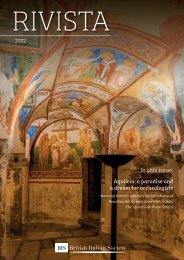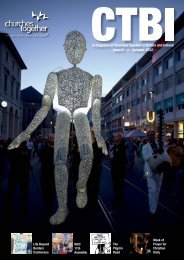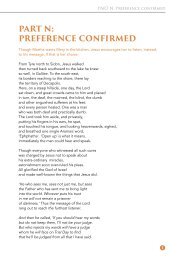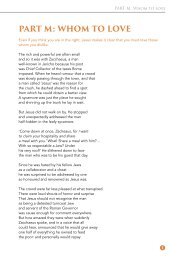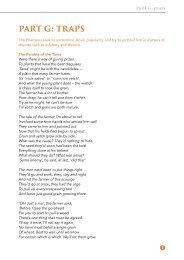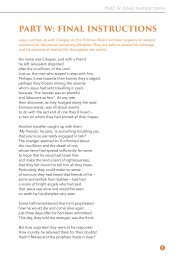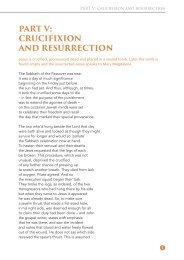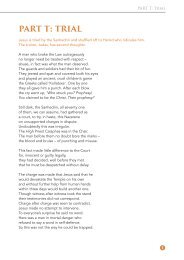You also want an ePaper? Increase the reach of your titles
YUMPU automatically turns print PDFs into web optimized ePapers that Google loves.
<strong>PART</strong> U: Sentence<br />
<strong>PART</strong> U: SENTENCE<br />
Pilate is manoeuvred into condemning Jesus to death: but publicly<br />
disowns responsibility.<br />
The time soon came when Pilate strode outside<br />
and faced the priests who’d wanted to condemn<br />
Jesus the Christ as common criminal.<br />
The Lord remained indoors, under guard,<br />
while Pilate made it clear he’d found no fault –<br />
and nor indeed had Herod Antipas –<br />
in the strange man they seemed to hate so much.<br />
‘I’ll therefore have him whipped and set him free.’<br />
The outrage that he faced from priests and scribes<br />
surprised the Procurator – till it dawned<br />
on him that envy was the motive that<br />
was driving them to yell out in disgust<br />
their wish to have him forthwith crucified.<br />
He would appeal to others in the crowd –<br />
those who had more to gain and less to lose.<br />
For most, the Nazarene was not a threat.<br />
He undermined the power and influence<br />
of Caiaphas and Annas and the rest:<br />
that was the reason for their hate of him.<br />
Thus, hoping to appeal to those who stood<br />
and waited for the judgement he’d pronounce,<br />
who had no axe to grind, Pilate announced:<br />
‘I have two men on trial. Which of them<br />
would you prefer I should release? Jesus,<br />
or the man Barabbas? Whom shall I free?<br />
‘Barabbas’ was the shout. ‘Let him go free!’<br />
‘And Jesus? What of him?’ ‘Crucify him!’<br />
This, perhaps, well-motivated auction,<br />
– for that is what it had turned out to be –<br />
was quite unjustified. Effectively,<br />
it classed the man whom he had wished to free<br />
as ‘Criminal’ and not as ‘Innocent.’<br />
In the same breath he could be spoken of<br />
as someone who had murdered and rebelled<br />
against the Roman rule. This was unjust.<br />
q
A gospel in blank verse with rhymed parables<br />
What’s more, the plan came instantly to grief.<br />
The High Priest’s party had made sure that folk,<br />
despite the early hour, had been induced,<br />
cajoled, prevailed upon, and organised<br />
in such a way that Pilate would believe<br />
the orchestrated baying of the crowd<br />
must represent the feelings of the Jews<br />
in general not only that of priests.<br />
When Pilate still seemed likely to reject<br />
the calls for Jesus to be crucified<br />
he faced the likelihood that there would be<br />
a riot – and besides that, something else –<br />
a subtler threat. There might be a complaint<br />
made to the Emperor himself, no less.<br />
A group of Hebrew notables might make<br />
the trip to Rome to tell Tiberius –<br />
to tell him what? – a priestly voice yelled out<br />
above the noise – ‘Jesus proclaimed himself<br />
a king! If you release this man, you are<br />
siding with enemies of Caesar. One<br />
who dubs himself a monarch is a threat<br />
to Rome’. “Maiestas populi Romani.”<br />
That was a principle of Roman rule –<br />
the preservation of the dignity<br />
and superiority of Romans<br />
everywhere. Since Tiberius was ‘The State’<br />
he could take the insult personally.<br />
The Governor, indeed, had much to fear.<br />
This would not be the first complaint. A list<br />
of briberies, of wanton injuries,<br />
of tantrums, theft, injustice and much else<br />
had reached the ears in Rome: this priestly straw<br />
might break the camel’s back. Pilate took stock.<br />
The longer he delayed the more the crowd<br />
displayed the likelihood there’d be a riot.<br />
‘Fetch me a bowl,’ he ordered hurriedly,<br />
‘with water and a towel.’ When this was done<br />
in full view of the crowd, he washed his hands<br />
and from his Judgement Seat he solemnly<br />
disowned responsibility for what<br />
he was about to do. ‘I’m not to blame<br />
for shedding this man’s blood’, he said. ‘You are!’<br />
w
<strong>PART</strong> U: Sentence<br />
‘The guilt shall fall on us and on our race<br />
upon our children and their children too!’<br />
was the reply. Thus Jesus was condemned.<br />
We are not told of Pilate’s wife’s response.<br />
Her husband had caved in. Jesus must die.<br />
He spoke the customary formula –<br />
‘Ibis in crucem’ which, translated meant,<br />
‘you will ascend the cross.’ And from then on<br />
normal procedures were in place… not quite.<br />
That was not all. Pilate devised a way<br />
of sneering at the Jews whose cleverness<br />
had out-manoeuvred him. Jesus had been<br />
condemned, because, they said, he claimed to be<br />
a king. He’d demonstrate the kind of king<br />
that they deserved – as trash, as conquered race,<br />
as underlings who would forever be<br />
inferior, beneath the Roman rule.<br />
The soldiery could be relied upon.<br />
They would devise some way to make his point.<br />
The crucifixion ritual began.<br />
A scourging was the normal overture<br />
preliminary to the death ordained.<br />
Many were killed before they reached the cross.<br />
Whips re-enforced with metal or with bone<br />
could lacerate the entrails of a man<br />
and lay them bare. The lash was merciless.<br />
Then add to this the blows and buffetings<br />
that Jesus had already undergone<br />
and you may glimpse (if glimpse you dare) the man<br />
the soldiers dressed in blooded scarlet robes<br />
the man to whom they gave a walking stick<br />
a cane-like reed, pressed into his right hand<br />
as if this symbol of fragility<br />
were carried like a sceptre to proclaim<br />
he was in fact a man of royal power.<br />
And finally to cap this cruel charade,<br />
someone had woven from a wayside shrub<br />
a crown. The plant had sharply vicious thorns,<br />
which, keen as razors, cut into his brow<br />
and scraped his scalp as it was rammed askew –<br />
to add more weight to his indignities.<br />
The game was not yet over. Hastily<br />
e
A gospel in blank verse with rhymed parables<br />
the men of Pontius Pilate’s personal guard –<br />
all ranks of that prestigious corps – turned out<br />
to bawl and whoop and cheer and make a noise<br />
as if the victim were an emperor.<br />
They shouted loud hurrahs! Hail! King of Jews!’<br />
And when they’d cheered and bowed and bent the knee<br />
they spat at him, and took his sceptre-stick<br />
to batter him upon his thorn-crowned head.<br />
At last they all grew tired of the game,<br />
stripped Jesus of his finery and dressed<br />
him once more in the clothes that he had worn.<br />
They put the beam to which he would be nailed<br />
into his helpless hands and pointed him<br />
the way to Golgotha. Try as he might<br />
he could not carry it. He was too weak<br />
and fell beneath its weight. No one would help.<br />
No one would suffer the indignity.<br />
The feast of Passover, when work was banned<br />
was hours away. The soldiers could use force<br />
to press-gang someone to pick up the plank<br />
without incurring too much local fuss.<br />
It was a stranger whom they seized upon.<br />
His name was Simon. He could not refuse.<br />
He was a Libyan, a Greek or Jew<br />
from Cyrenaica, as it was known<br />
till recent history – Cyrene then.<br />
The crowds who always followed in the wake<br />
of Jesus followed him that day. Women<br />
bewailed his sufferings and the bitter end<br />
that now confronted him. The Lord turned round<br />
and begged them not to weep for him, but for<br />
themselves. The future held for them alarms<br />
beyond description and beyond belief.<br />
The place for crucifixion was well marked.<br />
Posts that were firmly fixed already stood.<br />
The transom Simon carried was put down.<br />
The hands of Jesus, or his wrists, were nailed<br />
to either end as he lay on the floor.<br />
The cross piece then was fastened to the post.<br />
and to the post the soldiers nailed his feet.<br />
r
<strong>PART</strong> U: Sentence<br />
Not even this was disrespect enough.<br />
for kings appear with regal counsellors<br />
Two were provided, one on either side –<br />
…robbers? …rebels? …part of the daily crop<br />
of those condemned to face this cruel death.<br />
The road to Golgotha was very short<br />
a matter of just several hundred yards.<br />
The word denotes in Hebrew, ‘The Skull’s Place’<br />
It lay within the sight of city walls.<br />
and gained the name because a nearby hill<br />
was shaped in such a way as to suggest<br />
a human skull: not because skulls were left.<br />
Once they were dead, the crucified were moved.<br />
Accounts do differ, but we shall assume<br />
that at midday, the Nazarene began<br />
the sharp, fierce agony towards his death.<br />
Yet, he was heard to say, fighting for breath,<br />
‘Forgive them, Father. They are unaware<br />
of what it is they do. Forgive them all.’<br />
As was the Jewish custom of the time<br />
he had been offered myrrh stirred into wine<br />
as a narcotic that would dumb the pain,<br />
but this he had refused. Meanwhile, the squad<br />
who served that day as executioners<br />
were taking their pannicularia.<br />
The Emperor Hadrian had confirmed the right<br />
of soldiers to take all the clothes of one<br />
whom they’d been ordered they must crucify<br />
and share them. On this day they hit a snag.<br />
Between the four, most of his clothes could be<br />
divided without argument or fuss,<br />
but his undergarment was expensive<br />
and woven, like a High Priest’s, without seam.<br />
They had to have recourse to casting lots.<br />
With sticks of various lengths? Or dice? Who knows?<br />
The women who had come from Galilee<br />
and followed him so faithfully so long<br />
were weeping at a distance. Only four<br />
of them and just one man came close to him.<br />
They were his mother Mary, at his feet:<br />
her sister: and the wife of Cleopas,<br />
another Mary: plus the Magdalene –<br />
t
A gospel in blank verse with rhymed parables<br />
the Mary from Magdala by the Lake.<br />
And John was there who was to write this down.<br />
To him the Lord entrusted the sole care<br />
of his beloved mother in her grief<br />
and in her loneliness. ‘Here is your son,’<br />
he said to her: to John he said, ‘Here is<br />
your mother, John.’ And willingly from then<br />
he took her home with him and treated her<br />
with honour, with concern and with respect.<br />
Above each cross there was a titulus:<br />
a note to justify the victim’s fate.<br />
Above the cross of Jesus could be read<br />
a scroll in Hebrew, Latin and in Greek.<br />
‘Jesus the Nazarene, the King of Jews.’<br />
It was a studied insult, Pilate’s work.<br />
The Jews raised angry voices to protest.<br />
‘You should have written “This man falsely claimed<br />
that he was King of Jews” for otherwise<br />
it might be understood he represents<br />
as criminal, the best of all our race.’<br />
‘Well, take it as you wish. It’s written now.’<br />
was Pilate’s answer. He had scored a point.<br />
The place was overlooked by passers-by.<br />
Derisive catcalls came from those who passed…<br />
…things like, ‘If you’re the Son of God, come down.<br />
If you’d rebuild the Temple in three days<br />
what could be easier?’ ‘ You called yourself<br />
the Son of God. Well, all we want is proof!’<br />
One of the two men crucified with him<br />
joined in the chorus of complaint and cried,<br />
‘If you’re the Christ then save yourself and us.’<br />
But his companion would have none of this.<br />
‘We are condemned for wrongs that we have done.<br />
This man is guiltless. Lord remember me<br />
the moment that you find you are a king.’<br />
‘Today, you’ll be with me in Paradise,’<br />
was Jesus’s reply. About this time<br />
the light began to fail – the cause perhaps<br />
a dark and sand-filled desert wind known now<br />
as ‘Khamsin’ which could change the day to night.<br />
It caused the earth to shake and buildings swayed.<br />
A major earthquake seemed to be on hand.<br />
y
<strong>PART</strong> U: Sentence<br />
Rocks cracked: graves opened, and the Temple veil –<br />
the valance at the threshold of the room<br />
known as the Holy Place – was split from top<br />
to bottom. It was early afternoon.<br />
For those upon the cross the pain grew worse.<br />
A phrase in Aramaic rent the air<br />
‘Eli, eli, lamma sabachtani’<br />
Jesus was praying in his mother tongue<br />
a psalm of David which begins, ‘My God,<br />
My God, why have you left me on my own?’<br />
Someone who knew no Aramaic thought<br />
he called upon Elijah and proposed<br />
they wait, in case the prophet should appear<br />
to rescue him, but no help came. He called<br />
again. ‘I’m very thirsty’ he exclaimed..<br />
A soldier fixed a vinegar-soaked sponge<br />
on to his javelin’s point and passed it up<br />
until it reached the sufferer’s mouth and lips.<br />
It was the ninth hour – almost three o’clock –<br />
impenetrably dark when Jesus said,<br />
‘It is all over now. It has been done.’<br />
and calling out, ‘Father, into your hands<br />
my spirit I entrust’ he breathed his last.<br />
u
A gospel in blank verse with rhymed parables<br />
i





